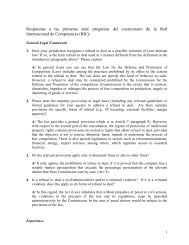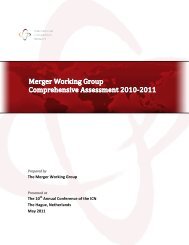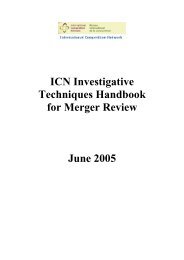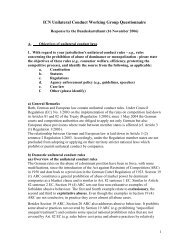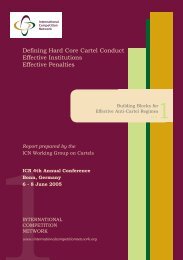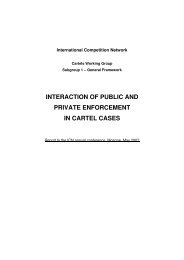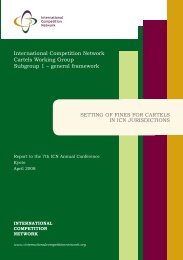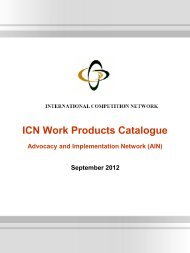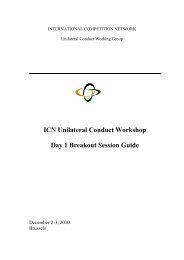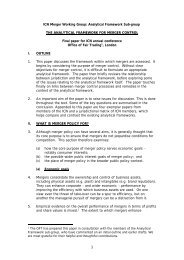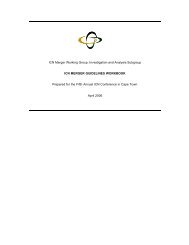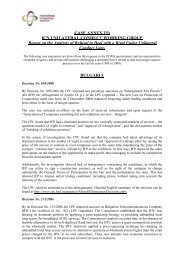Introduction to the ICN - International Competition Network
Introduction to the ICN - International Competition Network
Introduction to the ICN - International Competition Network
You also want an ePaper? Increase the reach of your titles
YUMPU automatically turns print PDFs into web optimized ePapers that Google loves.
•<br />
USER GUIDE<br />
This presentation provides an introduction <strong>to</strong> <strong>the</strong> <strong>International</strong> <strong>Competition</strong> <strong>Network</strong>.<br />
The next 27 slides present a general overview of <strong>the</strong> <strong>ICN</strong> and all of its working groups,<br />
followed by detailed information about each of <strong>the</strong> current working groups, as follows:<br />
– Merger Working Group (slides 28‐49)<br />
– Cartel Working Group (slides 50‐61)<br />
– Unilateral Conduct Working Group (slides 62‐71)<br />
– Advocacy Working Group (slides 72‐80)<br />
– Agency Effectiveness Working Group (slides 80‐86)<br />
• Items underlined are hyperlinked <strong>to</strong> <strong>the</strong> document described.<br />
• Since this presentation will usually be read and not presented orally, <strong>the</strong>re is a<br />
significant amount of text on <strong>the</strong> slides.<br />
• If reading <strong>the</strong> document in black and white hard copy, please choose “pure black and<br />
white” in color/grayscale print options.<br />
<strong>Introduction</strong> <strong>to</strong> <strong>ICN</strong>
<strong>Introduction</strong> <strong>to</strong> <strong>the</strong><br />
<strong>International</strong> <strong>Competition</strong> <strong>Network</strong><br />
www.internationalcompetitionnetwork.org
The <strong>International</strong> <strong>Competition</strong> <strong>Network</strong><br />
What is <strong>the</strong> <strong>ICN</strong>?<br />
. . .is a project‐oriented, consensus‐based, informal network of antitrust agencies from<br />
developed and developing countries that will address antitrust enforcement and policy<br />
issues of common interest and formulate proposals for proceduraland substantive<br />
convergence through a results‐oriented agenda and structure.<br />
‐ Memorandum on <strong>the</strong> Establishment and Operation of <strong>the</strong> <strong>ICN</strong><br />
For <strong>the</strong> Memorandum, see here. For additional information, see here and here.<br />
<strong>Introduction</strong> <strong>to</strong> <strong>ICN</strong>
•<br />
•<br />
Why was <strong>the</strong> <strong>ICN</strong> created?<br />
In <strong>the</strong> 1990s, economic globalization resulted in a significant increase in <strong>the</strong> number of<br />
mergers, cartels, and abuses of dominance cases that cross jurisdictional boundaries. At<br />
<strong>the</strong> same time, <strong>the</strong> number of competition authorities around <strong>the</strong> globe rapidly increased<br />
<strong>to</strong> nearly one hundred agencies.<br />
The <strong>International</strong> <strong>Competition</strong> Policy Advisory Committee, of 2000, recommended a<br />
“Global <strong>Competition</strong> Initiative” ‐ a forum for governments and <strong>the</strong> private sec<strong>to</strong>r <strong>to</strong><br />
consult on competition matters. While o<strong>the</strong>r multilateral organizations (e.g., OECD,<br />
UNCTAD) address competition issues, <strong>ICN</strong> members would be competition agencies, not<br />
States or Governments, and <strong>the</strong> <strong>ICN</strong> would focus only on competition (“all competition,<br />
all <strong>the</strong> time”).<br />
• The was <strong>ICN</strong> formed in Oc<strong>to</strong>ber 2001 by officials from 14 jurisdictions.<br />
<strong>Introduction</strong> <strong>to</strong> <strong>ICN</strong>
<strong>ICN</strong> Accomplishments<br />
Membership<br />
• Membership has increased from 16 agencies from 14 jurisdictions in 2001, <strong>to</strong> 112 agencies from<br />
99 jurisdictions in 2010.<br />
“Treasure trove” of work product<br />
•<br />
Work product produced in <strong>the</strong> areas of anti‐cartel enforcement, mergers, unilateral conduct,<br />
advocacy, agency effectiveness, capacity building, and regulated sec<strong>to</strong>rs; including best<br />
practices, case‐handling manuals, reports, templates on laws and rules in member jurisdictions,<br />
databases and <strong>to</strong>olkits.<br />
• Work product directly influencing member activity, many used in day‐<strong>to</strong>‐day practice as well as<br />
agency training programs.<br />
Creation of common standards in merger review, analysis, and unilateral conduct<br />
• Common standards leading <strong>to</strong> change, for example, more than half of <strong>ICN</strong> members have made<br />
changes <strong>to</strong> <strong>the</strong>ir merger control procedures <strong>to</strong> bring <strong>the</strong>m in<strong>to</strong> greater conformity with <strong>the</strong> <strong>ICN</strong>’s<br />
suggested best practice (“Recommended Practices”).<br />
• In many instances, <strong>the</strong> <strong>ICN</strong>’s practices served as a catalyst for <strong>the</strong> changes (e.g., Australia, Brazil,<br />
Czech Republic, European<br />
Union, Korea, United States)<br />
Greater cooperation<br />
• Increased interaction has led <strong>to</strong> better case cooperation, additional exchanges of good practices,<br />
and a greater understanding of each o<strong>the</strong>r’s laws and policies.<br />
For more information, see here. [link <strong>to</strong> achievements 2010 forthcoming]<br />
<strong>Introduction</strong> <strong>to</strong> <strong>ICN</strong>
The <strong>ICN</strong> Model<br />
Purpose<br />
• Promote procedural and substantive convergence around sound competition<br />
principles<br />
• Forum for officials <strong>to</strong> have regular contacts<br />
• Improved cooperation and coordination in enforcement policy<br />
• Reduction of unnecessary or duplicative processes / requirements<br />
• Dialogue on emerging issues<br />
• Practical emphasis<br />
Flexibility<br />
• Voluntary participation<br />
• No formalities<br />
• Address all competition <strong>to</strong>pics<br />
• Aspirational approach – no rule‐making authority; non‐binding work product:<br />
convergence by persuasion, not requirement<br />
<strong>Introduction</strong> <strong>to</strong> <strong>ICN</strong>
Membership<br />
• Open <strong>to</strong> competition authorities, see here<br />
Organization<br />
• Members work hand‐in‐hand with non‐governmental advisors (NGAs)<br />
Structure – virtual network<br />
• Project‐based: Working Groups/Special Projects<br />
• Members and NGAs volunteer <strong>to</strong> participate in Working Groups<br />
• Create discrete, project‐oriented work plans<br />
• Recommendations and papers are presented for adoption at annual<br />
conference<br />
• Communicate by conference calls, e‐mail<br />
• Specific‐<strong>to</strong>pic teleseminars, webinars, and workshops<br />
• <strong>ICN</strong> is Guided by a Steering Group (15 members + 3 ex officio members)<br />
• Chair selected by Steering Group, chair selects vice chairs<br />
• Steering Group guides <strong>ICN</strong>’s vision and strategy<br />
<strong>Introduction</strong> <strong>to</strong> <strong>ICN</strong>
• For a current list of all <strong>ICN</strong> members, click here.<br />
<strong>ICN</strong> Membership<br />
<strong>Introduction</strong> <strong>to</strong> <strong>ICN</strong>
•<br />
•<br />
Non-Governmental Advisors (NGAs)<br />
<strong>ICN</strong> agency members work closely with non‐governmental experts, including<br />
private practitioners, in‐house counsel, representatives of international<br />
organizations, industry and consumer groups, and academics. This structure<br />
promotes <strong>the</strong> interplay of public and private sec<strong>to</strong>r participation and expertise in<br />
<strong>the</strong> development of <strong>the</strong> <strong>ICN</strong>’s projects, resulting in a work product that benefits<br />
from <strong>the</strong> input of a wide spectrum of stakeholders.<br />
NGAs help identify projects; produce and offer important comments on work<br />
product; contribute <strong>to</strong> <strong>the</strong> policy dialogue at conferences and workshops; and help<br />
disseminate <strong>ICN</strong> work product and promote its use.<br />
• For more information, click here.<br />
<strong>Introduction</strong> <strong>to</strong> <strong>ICN</strong>
Working Groups<br />
• Mergers (2001‐present)<br />
• Advocacy (2001‐2003; 2008‐present)<br />
• Capacity Building / <strong>Competition</strong> Policy Implementation (2002‐2009)<br />
• Regulated Sec<strong>to</strong>rs (2003‐2005)<br />
• Cartels (2004‐present)<br />
• Telecom (2005‐2006)<br />
• Unilateral Conduct (2006‐present)<br />
• Agency Effectiveness (2009‐present)<br />
<strong>Introduction</strong> <strong>to</strong> <strong>ICN</strong>
•<br />
<strong>ICN</strong> Work Product<br />
Consensus‐Based Recommended Practices, as well as best practices, good<br />
practices, guiding principles and o<strong>the</strong>r guidance documents<br />
• Practical Enforcement Tools (handbooks, workbooks, manuals, templates,<br />
databases, and <strong>to</strong>olkits)<br />
• Comparative Reports (comprehensive reviews of standards and practices)<br />
• Workshops, Webinars, Teleseminars<br />
<strong>Introduction</strong> <strong>to</strong> <strong>ICN</strong>
Merger Working Group<br />
Mission<br />
• To promote <strong>the</strong> adoption of best practices in <strong>the</strong> design and operation of merger review<br />
regimes, in order <strong>to</strong>:<br />
• enhance <strong>the</strong> effectiveness<br />
of review mechanisms<br />
• facilitate convergence<br />
• reduce <strong>the</strong> time and cost of multijurisdictional merger reviews<br />
Current projects<br />
• New Recommended Practices on substantive merger analysis Self Assessment <strong>to</strong>ol for<br />
procedural Recommended Practices<br />
Upcoming projects<br />
• Survey of members <strong>to</strong> evaluate utility of existing work and preferences for future work<br />
• Policy‐level workshop in November 2010<br />
<strong>Introduction</strong> <strong>to</strong> <strong>ICN</strong>
• Recommended Practices<br />
– Notification & Review Procedures<br />
– Merger Analysis<br />
• Merger Guidelines Workbook<br />
• Handbook on Investigative Techniques<br />
• Merger Remedies Report<br />
• Notification and Procedure Reports<br />
• Model Confidentiality Waiver<br />
• Merger Templates<br />
• Workshops<br />
Merger WG: Selected Projects<br />
For more information about <strong>the</strong> Merger Working Group, see here.<br />
<strong>Introduction</strong> <strong>to</strong> <strong>ICN</strong>
Cartel Working Group<br />
Mission<br />
• To address <strong>the</strong> challenges of anti‐cartel enforcement, including <strong>the</strong> prevention, detection,<br />
investigation and punishment of cartel conduct, including understanding <strong>the</strong> necessity<br />
and benefits of <strong>the</strong> fight against cartels, and <strong>the</strong> enforcement <strong>to</strong>ols needed<br />
Current Projects<br />
• Annual Enforcer Workshops<br />
• Review & Update of Anti‐cartel Enforcement Manual chapters on digital evidence<br />
ga<strong>the</strong>ring and case initiation<br />
• Dialogue on hot <strong>to</strong>pics: Transitioning <strong>to</strong> criminal penalties<br />
Upcoming Projects<br />
• 2010 cartel enforcer workshop<br />
• New manual chapter on case resolution<br />
• Discussion series on cartel awareness/outreach programs<br />
<strong>Introduction</strong> <strong>to</strong> <strong>ICN</strong>
• Annual cartel workshops<br />
Cartel WG: Selected Projects<br />
• Manual on anti‐cartel enforcement techniques<br />
• Searches, Leniency, Digital Evidence, Case Initiation, Interviewing, and<br />
Investigative Strategy<br />
• Discussion papers on basic legal framework issues<br />
• Obstruction of Justice, Negotiated Settlements, <strong>International</strong> Cooperation,<br />
Cartel Fines, and Interaction of Private and Public Enforcement<br />
• Templates on anti‐cartel enforcement<br />
For more information about <strong>the</strong> Cartel Working Group, see here.<br />
<strong>Introduction</strong> <strong>to</strong> <strong>ICN</strong>
Unilateral Conduct Working Group<br />
Mission<br />
• To examine <strong>the</strong> challenges involved in addressing unilateral conduct of dominant firms<br />
• To facilitate greater understanding of <strong>the</strong> issues involved in analyzing unilateral conduct<br />
• To promote convergence and sound enforcement of laws governing unilateral conduct<br />
Current Projects<br />
• Additional comparative work on specific types of unilateral conduct: refusal <strong>to</strong> deal with<br />
a rival & margin squeeze<br />
• Webinars on “excessive” pricing and remedies<br />
Upcoming Projects<br />
• Unilateral Conduct Workbook<br />
• Unilateral Conduct Workshop (December 2010)<br />
• Fur<strong>the</strong>r work on conduct<br />
• Webinars<br />
<strong>Introduction</strong> <strong>to</strong> <strong>ICN</strong>
• Recommended Practices<br />
Unilateral Conduct WG: Selected Projects<br />
– On <strong>the</strong> assessment of substantial market power and dominance under unilateral‐<br />
conduct laws<br />
– On <strong>the</strong> application of unilateral‐conduct rules <strong>to</strong> state‐created monopolies<br />
• Reports<br />
– On objectives of unilateral conduct laws and <strong>the</strong> assessment of dominance<br />
–<br />
On specific types of conduct by dominant firms: (1) preda<strong>to</strong>ry pricing, (2) exclusive<br />
dealing, (3) tying and bundled discounting, (4) single‐product loyalty discounts and<br />
rebates, and (5) refusal <strong>to</strong> deal with rivals and margin squeeze<br />
• Workshop & Webinars<br />
– Webcast of <strong>the</strong> March 2009 workshop on assessing dominance & evaluating<br />
unilateral conduct is available here.<br />
–<br />
Recordings of <strong>the</strong> November 2010 webinar on “excessive pricing” and March 2010<br />
webinar on remedies in unilateral conduct cases are available here.<br />
For more information about <strong>the</strong> Unilateral Conduct Working Group,see here.<br />
<strong>Introduction</strong> <strong>to</strong> <strong>ICN</strong>
Advocacy Working Group<br />
Mission<br />
• To develop practical <strong>to</strong>ols and guidance <strong>to</strong> improve <strong>the</strong> effectiveness of <strong>ICN</strong> members’<br />
advocacy activities, including in <strong>the</strong> area of market studies<br />
Current Projects<br />
• Market Studies Handbook<br />
• Teleseminars on evaluating advocacy initiatives, advocacy and <strong>the</strong> financial crisis, etc.<br />
Upcoming Projects<br />
• Revise 2003 Advocacy Toolkit<br />
• Beta test Market Studies Handbook<br />
• Continue teleseminar series<br />
<strong>Introduction</strong> <strong>to</strong> <strong>ICN</strong>
Advocacy WG: Selected Projects<br />
• Advocacy “<strong>to</strong>olkit” for agency officials and media<br />
• Detailed reports on advocacy provisions and practices of <strong>ICN</strong> members<br />
• Report on <strong>ICN</strong> member experience with market studies<br />
• Agency Handbook on Market Studies<br />
For more information about <strong>the</strong> Advocacy Working Group, see here.<br />
<strong>Introduction</strong> <strong>to</strong> <strong>ICN</strong>
Agency Effectiveness Working Group<br />
Mission<br />
• To examine a variety of fac<strong>to</strong>rs determining <strong>the</strong> ability of competition agencies <strong>to</strong><br />
achieve <strong>the</strong>ir objectives in an efficient and effective way<br />
Current projects<br />
• Chapter on strategic planning and prioritization for Agency Practice Manual<br />
Upcoming Projects<br />
• Workshop for senior agency officials in July 2010<br />
• Chapter on effective project delivery for Agency Practice Manual<br />
For more information about <strong>the</strong> Agency Effectiveness Working Group, see here.<br />
<strong>Introduction</strong> <strong>to</strong> <strong>ICN</strong>
Capacity Building / <strong>Competition</strong> Policy Implementation<br />
Working Group: Selected Projects 2002-2009<br />
• Findings on <strong>the</strong> effectiveness of technical assistance<br />
• Comprehensive examination of past technical assistance projects<br />
• Electronic <strong>to</strong>olkit compiling business outreach practices from around <strong>the</strong> world<br />
• Advocacy reports<br />
• Business outreach, regula<strong>to</strong>rs, and judiciary<br />
• Agency effectiveness reports<br />
For specific work product, see here.<br />
<strong>Introduction</strong> <strong>to</strong> <strong>ICN</strong>
Regulated Sec<strong>to</strong>rs Working Groups: 2003-2006<br />
Antitrust Enforcement in Regulated Sec<strong>to</strong>rs Working Group: 20032005<br />
• Explored <strong>the</strong> legal and practical aspects of <strong>the</strong> relations between competition agencies<br />
and sec<strong>to</strong>ral regula<strong>to</strong>rs in two comparison reports<br />
• Produced “Best practices for <strong>the</strong> role of competition in banking regulation”<br />
Telecommunications Working Group: 20052006<br />
• Examined how technology affects competition, and <strong>the</strong> challenges that technological<br />
innovation presents for competition authorities<br />
• Produced “Suggested best practices for promoting and maintaining competition in <strong>the</strong><br />
telecommunications sec<strong>to</strong>r”<br />
For more information about <strong>the</strong>se working groups, see here.<br />
<strong>Introduction</strong> <strong>to</strong> <strong>ICN</strong>
•<br />
Advocacy and Implementation <strong>Network</strong><br />
To promote <strong>the</strong> implementation of <strong>ICN</strong> recommendations and <strong>the</strong> useof <strong>ICN</strong> work<br />
products and experience in general, <strong>ICN</strong> launched <strong>the</strong> Advocacy and Implementation<br />
<strong>Network</strong> Support Program (AISUP) in 2008.<br />
• AISUP complements <strong>the</strong> project‐oriented nature of <strong>the</strong> network’s activity.<br />
• Members request assistance through AISUP, and <strong>the</strong> Vice Chair for Advocacy and<br />
Implementation pairs <strong>the</strong> requesting agency with expert staff from o<strong>the</strong>r <strong>ICN</strong><br />
member agencies.<br />
• The supporting agencies provide <strong>the</strong> requesting agency with a thorough explanation<br />
of relevant <strong>ICN</strong> work product and advice on implementation, as appropriate.<br />
To participate in AISUP, click here.<br />
<strong>Introduction</strong> <strong>to</strong> <strong>ICN</strong>
<strong>ICN</strong> Blog<br />
• The <strong>ICN</strong> Blog aims <strong>to</strong> enhance communication, increase participation in <strong>ICN</strong> projects,<br />
promote <strong>the</strong> use of <strong>ICN</strong> work product, and facilitate contact among members by:<br />
• Providing information about upcoming <strong>ICN</strong> events<br />
• Profiling <strong>ICN</strong> work product<br />
•<br />
Noting key developments in <strong>ICN</strong> member jurisdictions<br />
• The <strong>ICN</strong> Blog is available here.<br />
Visit: www.icnblog.org<br />
<strong>Introduction</strong> <strong>to</strong> <strong>ICN</strong>
Get Involved: Agencies<br />
Members<br />
• Working Groups benefit from broad participation of members from different geographic<br />
regions and in various stages of development. If your agency would like <strong>to</strong> get more<br />
involved in an <strong>ICN</strong> working group, please visit <strong>the</strong> home page of <strong>the</strong> Working Group or<br />
Groups that interest you and e‐mail or call <strong>the</strong> listed contacts. Alternatively, you may<br />
contact <strong>the</strong> <strong>ICN</strong> Secretariat for suggestions about where your agency might best<br />
contribute.<br />
NonMembers<br />
• If you are a national or multinational competition agency or a competition agency of a<br />
cus<strong>to</strong>ms terri<strong>to</strong>ry entrusted with <strong>the</strong> enforcement of competition law(s) that has not yet<br />
joined <strong>the</strong> <strong>ICN</strong>, we encourage you <strong>to</strong> do so. Click here for membership information and<br />
an application <strong>to</strong> join <strong>the</strong> <strong>ICN</strong>.<br />
<strong>Introduction</strong> <strong>to</strong> <strong>ICN</strong>
•<br />
•<br />
Becoming an NGA<br />
If you are interested in becoming an NGA, you can contact <strong>the</strong> member agency in your<br />
jurisdiction. Contact information is available here. You may also contact <strong>the</strong> <strong>ICN</strong>’s NGA<br />
liaison, Bruno Lasserre, President of <strong>the</strong> French Au<strong>to</strong>rité de la concurrence, via<br />
Stéphanie Yon, adviser for international affairs in <strong>the</strong> Office of <strong>the</strong> President, here.<br />
In contacting your member agency, it is helpful <strong>to</strong> identify <strong>the</strong> particular project(s) of<br />
interest <strong>to</strong> you. Details of current projects are available on <strong>the</strong> <strong>ICN</strong>’s website.<br />
Commitment <strong>to</strong> a particular project varies, but typically involves a minimum of two<br />
hours per month, in addition <strong>to</strong> participation in biweekly or monthly conference calls.<br />
<strong>Introduction</strong> <strong>to</strong> <strong>ICN</strong>
Find <strong>the</strong> <strong>ICN</strong> at:<br />
www.internationalcompetitionnetwork.org
<strong>Introduction</strong> <strong>to</strong> <strong>the</strong> Merger Working Group<br />
<strong>International</strong> <strong>Competition</strong> <strong>Network</strong>
Merger Working Group: Mission<br />
• To promote <strong>the</strong> adoption of best practices in <strong>the</strong> design and operation of merger review<br />
regimes, in order <strong>to</strong>:<br />
– enhance <strong>the</strong> effectiveness<br />
of review mechanisms<br />
– facilitate convergence<br />
– reduce <strong>the</strong> time and cost of multijurisdictional merger reviews<br />
<strong>Introduction</strong> <strong>to</strong> <strong>ICN</strong>: Merger WG
• Recommended Practices<br />
– Merger Notification & Review Procedures<br />
– Merger Analysis<br />
• Merger Guidelines Workbook<br />
• Handbook on Investigative Techniques<br />
• Merger Remedies Report<br />
• Notification Reports<br />
Merger Working Group:<br />
Selected Projects<br />
– Model Confidentiality Waiver; Setting Notification Thresholds; Defining Merger<br />
Transactions; Notification Information Requirements<br />
• Merger Templates<br />
• Workshops<br />
<strong>Introduction</strong> <strong>to</strong> <strong>ICN</strong>: Merger WG
• Sovereignty<br />
• Transparency<br />
• Nondiscrimination on <strong>the</strong> basis of nationality<br />
• Procedural Fairness<br />
•<br />
Guiding Principles for Merger<br />
Notification and Review Procedures<br />
• Efficient, timely, and effective review<br />
• Coordination<br />
• Convergence<br />
• Protection of confidential information<br />
The Guiding Principles and Recommended Practices are non‐binding aspirational statements. After<br />
<strong>the</strong> <strong>ICN</strong> reaches consensus on Recommended Practices, it is left <strong>to</strong> <strong>the</strong> individual competition<br />
authorities <strong>to</strong> decide whe<strong>the</strong>r, how, and when <strong>to</strong> implement <strong>the</strong> recommendations.<br />
• Agencies implement <strong>the</strong> practices through efforts such as legislative change, rulemaking, internal<br />
practice, and speeches, as appropriate.<br />
<strong>Introduction</strong> <strong>to</strong> <strong>ICN</strong>: Merger WG
1.<br />
2.<br />
3.<br />
4.<br />
5.<br />
6.<br />
7.<br />
8.<br />
Guiding Principles for Merger Notification and Review<br />
Sovereignty. Jurisdictions are sovereign with respect <strong>to</strong> <strong>the</strong> application of <strong>the</strong>ir own laws <strong>to</strong> mergers.<br />
Transparency.<br />
In order <strong>to</strong> foster consistency, predictability, and fairness, <strong>the</strong> merger review process should be transparent with<br />
respect <strong>to</strong> <strong>the</strong> policies, practices, and procedures involved in <strong>the</strong> review, <strong>the</strong> identity of <strong>the</strong> decision‐maker(s), <strong>the</strong> substantive<br />
standard of review, and <strong>the</strong> bases of any adverse enforcement decisions on <strong>the</strong> merits.<br />
Nondiscrimination on <strong>the</strong> basis of nationality. In <strong>the</strong> merger review process, jurisdictions should not discriminate in <strong>the</strong><br />
application of competition laws and regulations on <strong>the</strong> basis of nationality.<br />
Procedural fairness.<br />
Prior <strong>to</strong> a final adverse decision on <strong>the</strong> merits, merging parties should be informed of <strong>the</strong> competitive<br />
concerns that form <strong>the</strong> basis for <strong>the</strong> proposed adverse decision and <strong>the</strong> factual basis upon which such concerns are based, and<br />
should have an opportunity <strong>to</strong> express <strong>the</strong>ir views in relation <strong>to</strong> those concerns. Reviewing jurisdictions should provide an<br />
opportunity for review of such decisions before a separate adjudicative body. Third parties that believe <strong>the</strong>y would be harmed by<br />
potential anticompetitive effects of a proposed transaction should be allowed <strong>to</strong> express <strong>the</strong>ir views in <strong>the</strong> course of <strong>the</strong> merger<br />
review process.<br />
Efficient, timely, and effective review.<br />
The merger review process should provide enforcement agencies with information<br />
needed <strong>to</strong> review <strong>the</strong> competitive effects of transactions and should not impose unnecessary costs on transactions. The review of<br />
transactions should be conducted, and any resulting enforcement decision should be made, within a reasonable and determinable<br />
time frame.<br />
Coordination. Jurisdictions reviewing <strong>the</strong> same transaction should engage in such coordination as would, without compromising<br />
enforcement of domestic laws, enhance <strong>the</strong> efficiency and effectiveness of <strong>the</strong> review process and reduce transaction costs.<br />
Convergence. Jurisdictions should seek convergence of merger review processes <strong>to</strong>ward agreed best practices.<br />
Protection of confidential information. The merger review process should provide for <strong>the</strong> protection of confidential<br />
information.<br />
<strong>Introduction</strong> <strong>to</strong> <strong>ICN</strong>: Merger WG
Recommended Practices for Merger<br />
Notification & Review Procedures (N&P RPs)<br />
The Recommended Practices address:<br />
1. nexus between <strong>the</strong> merger’s effects and <strong>the</strong> reviewing jurisdiction;<br />
2. clear and objective notification thresholds;<br />
3. timing of merger notification;<br />
4. merger review periods;<br />
5. requirements for initial notification;<br />
6. conduct of merger investigations;<br />
7. procedural fairness;<br />
8. transparency;<br />
9. confidentiality;<br />
10. interagency coordination;<br />
11. remedies;<br />
12. competition agency powers; and<br />
13. review of merger control provisions.<br />
Recommended Practices are available in English, French, and Spanish.<br />
<strong>Introduction</strong> <strong>to</strong> <strong>ICN</strong>: Merger WG
• Nexus <strong>to</strong> Reviewing Jurisdiction<br />
N&P RPs: Reducing Burdens<br />
– Screens out mergers lacking appreciable effects<br />
• Notification Thresholds<br />
– Reduces uncertainty as <strong>to</strong> when <strong>to</strong> file<br />
– Bases thresholds on objective measures<br />
• Timing of Notification<br />
– Eliminates filing deadlines for suspensive regimes<br />
• Initial Notification Requirements<br />
– Minimizes information required in a filing <strong>to</strong> that necessary forreview<br />
<strong>Introduction</strong> <strong>to</strong> <strong>ICN</strong>: Merger WG
• Transparency<br />
N&P RPs: Agency Process<br />
– Transparency in application of merger<br />
laws; criteria for review<br />
• Interagency Coordination<br />
– Seek <strong>to</strong> coordinate reviews that may raise competitive issues of common concern<br />
– Avoid inconsistent remedies<br />
• Review of Merger Provisions<br />
• Agency Powers<br />
<strong>Introduction</strong> <strong>to</strong> <strong>ICN</strong>: Merger WG
• Review Periods<br />
N&P RPs: Agency Process<br />
– Reasonable time period (6 weeks or less for phase 1, capable of completion in 6<br />
months or less for phase 2); determinable<br />
periods<br />
• Procedural Fairness<br />
– agencies should provide merging parties with sufficient and timely information<br />
on competitive concerns<br />
– parties should<br />
be given <strong>the</strong> opportunity <strong>to</strong> respond <strong>to</strong> such concerns<br />
• Confidentiality<br />
• Conduct of Investigations<br />
• Procedural Aspects of Remedies<br />
<strong>Introduction</strong> <strong>to</strong> <strong>ICN</strong>: Merger WG
•<br />
•<br />
Notification & Procedures RPs I and II<br />
Nexus <strong>to</strong> Reviewing Jurisdiction.<br />
Agencies should not assert jurisdiction over a merger<br />
unless <strong>the</strong> transaction would have an appreciable impact on <strong>the</strong> jurisdiction. Jurisdiction<br />
should be asserted only over transactions that have a nexus with <strong>the</strong> jurisdiction<br />
concerned that meets an appropriate standard of materiality, based on activity within<br />
that jurisdiction.<br />
Objective Notification Thresholds.<br />
Notification thresholds should be clear and<br />
understandable, based on objectively quantifiable criteria (such as sales or assets, ra<strong>the</strong>r<br />
than market share), and based on information that is readily accessible <strong>to</strong> <strong>the</strong> merging<br />
parties.<br />
<strong>Introduction</strong> <strong>to</strong> <strong>ICN</strong>: Merger WG
•<br />
•<br />
Notification & Procedures RPs III and IV<br />
Timing of Notification.<br />
Parties should be permitted <strong>to</strong> notify proposed mergers upon<br />
certification of a good faith intent <strong>to</strong> consummate <strong>the</strong> proposed transaction. Jurisdictions<br />
that prohibit closing while <strong>the</strong> competition agency reviews <strong>the</strong> transaction should not<br />
impose deadlines for notification. Jurisdictions that do not prohibit closing pending<br />
review should allow parties a reasonable time in which <strong>to</strong> notify following a clearly<br />
defined triggering event.<br />
Review Periods<br />
. Reviews should be completed within a reasonable time period, taking<br />
in<strong>to</strong> account such fac<strong>to</strong>rs as <strong>the</strong> complexity of <strong>the</strong> transaction, <strong>the</strong> availability of<br />
information, and <strong>the</strong> timeliness of responses. To avoid uncertainty, <strong>the</strong> practice calls for<br />
specified periods for initial waiting periods or reviews and a determinable time frame<br />
for extended waiting periods or reviews. Initial review periods should expire in six<br />
weeks or less, while extended reviews should be capable of completion in six months or<br />
less.<br />
<strong>Introduction</strong> <strong>to</strong> <strong>ICN</strong>: Merger WG
• Model Confidentiality Waiver, here<br />
• Setting Notification Thresholds, here<br />
• Defining Merger Transactions, here<br />
• Notification Information Requests, here<br />
Selected Notification Reports<br />
<strong>Introduction</strong> <strong>to</strong> <strong>ICN</strong>: Merger WG
• Concepts and core principles of merger analysis<br />
Merger Guidelines Workbook<br />
• Addresses analytical framework common <strong>to</strong> member merger guidelines and explains<br />
why those <strong>to</strong>pics have value in merger assessment<br />
– Market Definition<br />
– Market structure and concentration<br />
– Unilateral Effects<br />
– Coordinated Effects<br />
– Market Entry and expansion<br />
– Efficiencies<br />
–<br />
Failing Firm<br />
The Merger Guidelines Workbook is available here.<br />
<strong>Introduction</strong> <strong>to</strong> <strong>ICN</strong>: Merger WG
Recommended Practices For Merger Analysis<br />
• The Legal Framework for <strong>Competition</strong> Merger Analysis<br />
• The Use of Market Shares: Thresholds & Presumptions<br />
• Entry & Expansion<br />
• Overview of Competitive Effects Analysis in Horizontal Merger Review<br />
• Unilateral Effects<br />
• Coordinated Effects<br />
These Recommended Practices are available here.<br />
<strong>Introduction</strong> <strong>to</strong> <strong>ICN</strong>: Merger WG
•<br />
Recommended Practices for<br />
Merger Analysis<br />
Legal Framework for <strong>Competition</strong> Merger Analysis.<br />
The purpose of merger analysis is <strong>to</strong><br />
identify and prevent or remedy only those mergers that are likely <strong>to</strong> harm competition<br />
significantly.<br />
• Use of Market Shares.<br />
Market shares and measures of market concentration play an<br />
important role in merger analysis but are not determinative of possible competition<br />
concerns.<br />
• Entry<br />
. The assessment of firm entry and/or expansion by existing competi<strong>to</strong>rs should be<br />
an integral part of <strong>the</strong> analysis of whe<strong>the</strong>r a merger is likely <strong>to</strong> harm competition<br />
significantly.<br />
<strong>Introduction</strong> <strong>to</strong> <strong>ICN</strong>: Merger WG
Recommended Practices for<br />
Merger Analysis<br />
• Overview of Competitive Effects Analysis.<br />
The goal of competitive effects analysis is <strong>to</strong><br />
assess whe<strong>the</strong>r a merger is likely <strong>to</strong> harm competition significantly by creating or<br />
enhancing <strong>the</strong> merged firm’ s ability or incentives <strong>to</strong> exercise market power, ei<strong>the</strong>r<br />
unilaterally or in coordination with rivals.<br />
• Unilateral Effects.<br />
In analyzing <strong>the</strong> potential for unilateral effects, agencies should assess<br />
whe<strong>the</strong>r <strong>the</strong> merger is likely <strong>to</strong> harm competition significantly by creating or enhancing<br />
<strong>the</strong> merged firm’ s ability or incentives <strong>to</strong> exercise market power independently.<br />
• Coordinated Effects.<br />
In analyzing <strong>the</strong> potential for coordinated effects, agencies should<br />
assess whe<strong>the</strong>r <strong>the</strong> merger increases <strong>the</strong> likelihood that firms in <strong>the</strong> market will<br />
successfully coordinate <strong>the</strong>ir behavior or streng<strong>the</strong>n existing coordination in a manner<br />
that harms competition significantly.<br />
<strong>Introduction</strong> <strong>to</strong> <strong>ICN</strong>: Merger WG
•<br />
Handbook on Investigative Techniques<br />
for Merger Review<br />
Designed <strong>to</strong> inform <strong>ICN</strong> members of <strong>the</strong> various <strong>to</strong>ols and techniques used in merger<br />
review.<br />
• Chapter 1 summarizes <strong>the</strong> findings of a survey of <strong>ICN</strong> members carried out in 2003.<br />
• Additional chapters discuss: (i) how <strong>to</strong> plan a merger investigation; (ii) developing<br />
reliable evidence in merger cases; (iii) economic and econometric analyses; (iv) <strong>the</strong><br />
benefits of including economists in merger review; and (v) a private sec<strong>to</strong>r perspective<br />
on merger review.<br />
The Handbook is available here.<br />
<strong>Introduction</strong> <strong>to</strong> <strong>ICN</strong>: Merger WG
Merger Remedies Report<br />
Report based on merger remedy practices in a variety of jurisdictions, covering <strong>the</strong><br />
principles, design, & implementation of merger remedies<br />
• Practical guidance<br />
• Range of <strong>to</strong>ols for remedies<br />
• Examples<br />
The Remedies Report is available here.<br />
<strong>Introduction</strong> <strong>to</strong> <strong>ICN</strong>: Merger WG
Merger Templates<br />
<strong>Introduction</strong> <strong>to</strong> <strong>ICN</strong>: Merger WG
•<br />
Workshops<br />
The Merger Working Group has sponsored a series of workshops covering <strong>the</strong><br />
notification, investigation and analysis of mergers, attended by member agencies and<br />
NGAs. The workshops:<br />
– promote existing <strong>ICN</strong> merger work<br />
– include training‐style exercises based on a hypo<strong>the</strong>tical merger<br />
– include merger policy discussions<br />
• Past workshops were held in Washing<strong>to</strong>n, DC, Brussels, Dublin, Brno, Pre<strong>to</strong>ria, and<br />
Taipei. The next MWG workshop is scheduled for November 2010 in Rome.<br />
<strong>Introduction</strong> <strong>to</strong> <strong>ICN</strong>: Merger WG
• Recommended Practices for Analysis on:<br />
– Market Definition<br />
– Failing Firm<br />
• Implementation of Recommended Practices<br />
Merger Working Group:<br />
Current and Future Work<br />
• Survey of members <strong>to</strong> evaluate utility of existing work and preferences for future work<br />
• Policy‐level workshop in November 2010<br />
<strong>Introduction</strong> <strong>to</strong> <strong>ICN</strong>: Merger WG
Find Merger Working Group at:<br />
https://www.internationalcompetitionnetwork.org/working-<br />
groups/current/merger.aspx
<strong>Introduction</strong> <strong>to</strong> <strong>the</strong> Cartel Working Group<br />
<strong>International</strong> <strong>Competition</strong> <strong>Network</strong>
•<br />
Cartel Working Group: Mission<br />
To address <strong>the</strong> challenges of anti‐cartel enforcement, including <strong>the</strong> prevention, detection,<br />
investigation and punishment of cartel conduct, both domestically and internationally,<br />
across <strong>the</strong> entire range of <strong>ICN</strong> members with differing levels of experience and resources<br />
<strong>Introduction</strong> <strong>to</strong> <strong>ICN</strong>: Cartel WG
Cartel Working Group: Structure<br />
Legal Framework subgroup<br />
• Addresses legal and policy challenges of anti‐cartel enforcement<br />
Enforcement Techniques subgroup<br />
• Aims <strong>to</strong> identify and share effective investigative techniques and develop <strong>the</strong><br />
<strong>International</strong> Cartel Workshops<br />
<strong>Introduction</strong> <strong>to</strong> <strong>ICN</strong>: Cartel WG
Cartel WG: Selected Projects<br />
• Manual on Anti‐Cartel Enforcement Techniques<br />
• Reports on:<br />
– Building Blocks for Effective Anti‐Cartel Regimes<br />
– Interaction of Public and Private Enforcement in Cartel Cases<br />
– Cooperation Between <strong>Competition</strong> Agencies in Cartel Investigations<br />
– Obstruction of Justice in Cartel Investigations<br />
– Cartel Settlements<br />
– Setting Fines<br />
• Anti‐Cartel Enforcement Templates, here<br />
<strong>Introduction</strong> <strong>to</strong> <strong>ICN</strong>: Cartel WG
•<br />
Annual <strong>ICN</strong> Cartel Workshops<br />
A continuation of <strong>the</strong> successful series of agency‐led <strong>International</strong> Cartel Conferences<br />
that were initiated in 1999 by <strong>the</strong> US DOJ<br />
• This year: Oc<strong>to</strong>ber 4‐7, 2010 in Yokohama, Japan<br />
• Discussions focus on:<br />
– Existing <strong>ICN</strong> Cartel Work Product<br />
– Investigative Techniques (often using hypo<strong>the</strong>tical cases)<br />
– Current trends and hot <strong>to</strong>pics in anti‐cartel enforcement<br />
<strong>Introduction</strong> <strong>to</strong> <strong>ICN</strong>: Cartel WG
The Manual includes chapters on<br />
Manual on Anti-Cartel Enforcement<br />
Techniques<br />
– Searches, Raids, and Inspections<br />
– Drafting and Implementing an Effective Leniency Program<br />
– Digital Evidence Ga<strong>the</strong>ring<br />
– Cartel Case Initiation<br />
– Interviewing<br />
– Investigative Strategy<br />
The Manual is available here.<br />
<strong>Introduction</strong> <strong>to</strong> <strong>ICN</strong>: Cartel WG
Building Blocks for Effective AntiCartel Regimes<br />
Reports<br />
• Draws upon experience from member jurisdictions on:<br />
– Defining hard core cartel conduct,<br />
– Sample organizational arrangements that agencies make <strong>to</strong> prosecute cartels, and<br />
– Effective penalties applied <strong>to</strong> cartel conduct.<br />
The Report is available here.<br />
Interaction of Public and Private Enforcement<br />
•<br />
Compiled information provided by competition authorities and NGAs on <strong>the</strong> extent <strong>to</strong><br />
which private enforcement currently exists and may complement or conflict with public<br />
enforcement.<br />
The Report is available here.<br />
<strong>Introduction</strong> <strong>to</strong> <strong>ICN</strong>: Cartel WG
Additional Reports<br />
Cooperation Between <strong>Competition</strong> Agencies in Cartel Investigations<br />
•<br />
Provides a s<strong>to</strong>cktaking of <strong>the</strong> various forms of cooperation and coordination among<br />
agencies in cartel investigations, including cooperation mechanisms contained in<br />
existing statutes, agreements, and treaties, and barriers <strong>to</strong> greater cooperation.<br />
• Explores potential ways <strong>to</strong> enhance or promote cooperation in anti‐cartel enforcement.<br />
The Report is available here.<br />
Obstruction of Justice in Cartel Investigations<br />
•<br />
Explains why identifying and pursuing obstruction is critical <strong>to</strong> anti‐cartel enforcement<br />
and highlights what enforcers are doing <strong>to</strong> prevent obstruction during cartel<br />
investigations.<br />
The Report is available here.<br />
<strong>Introduction</strong> <strong>to</strong> <strong>ICN</strong>: Cartel WG
Cartel Settlements Report<br />
•<br />
Additional Reports<br />
Explores <strong>the</strong> role that negotiated settlements play in anti‐cartel enforcement, addressing<br />
<strong>the</strong> underlying principles and benefits of settlements and practical aspects of achieving<br />
<strong>the</strong>m.<br />
This Report is available here.<br />
Setting Cartel Fines<br />
• Reviews how corporate fines for hardcore cartels are determined in member<br />
jurisdictions, addressing practical issues that jurisdictions face in setting fines.<br />
This Report is available here.<br />
<strong>Introduction</strong> <strong>to</strong> <strong>ICN</strong>: Cartel WG
Templates<br />
<strong>Introduction</strong> <strong>to</strong> <strong>ICN</strong>: Cartel WG
• Annual Workshops<br />
• <strong>ICN</strong> Anti‐Cartel Enforcement Manual<br />
– Searches and Leniency<br />
– Digital evidence and Case Initiation<br />
– New chapter on Case Resolution<br />
• Hot <strong>to</strong>pic Roundtable Discussions<br />
Cartel Working Group:<br />
Current and Future Work<br />
– 2009‐2010 on transitioning <strong>to</strong> criminal sanctions<br />
– 2010‐2011 on cartel awareness/outreach efforts<br />
<strong>Introduction</strong> <strong>to</strong> <strong>ICN</strong>: Cartel WG
Find Cartel Working Group at:<br />
https://www.internationalcompetitionnetwork.org/working-<br />
groups/current/cartel.aspx
<strong>Introduction</strong> <strong>to</strong> <strong>the</strong> Unilateral Conduct Working Group<br />
<strong>International</strong> <strong>Competition</strong> <strong>Network</strong>
•<br />
Unilateral Conduct Working Group: Mission<br />
To examine <strong>the</strong> challenges involved in addressing unilateral conduct of dominant firms<br />
• To facilitate greater understanding of <strong>the</strong> issues involved in analyzing unilateral conduct<br />
• To promote convergence and sound enforcement of laws governing unilateral conduct<br />
<strong>Introduction</strong> <strong>to</strong> <strong>ICN</strong>: UCWG
• Recommended Practices<br />
Unilateral Conduct WG: Selected Projects<br />
– Assessment of substantial market power (SMP) and dominance under unilateral‐<br />
conduct laws<br />
– Application of unilateral‐conduct rules <strong>to</strong> state‐created monopolies<br />
• Reports<br />
– Objectives of Unilateral Conduct Laws and <strong>the</strong> Assessment of Dominance<br />
–<br />
Specific types of conduct by dominant firms: (1) preda<strong>to</strong>ry pricing, (2) exclusive<br />
dealing, (3) tying and bundled discounting, (4) loyalty discounts and rebates, (5)<br />
refusal <strong>to</strong> deal with a rival and margin squeeze<br />
• Workshop & Teleseminars<br />
<strong>Introduction</strong> <strong>to</strong> <strong>ICN</strong>: UCWG
General Framework:<br />
Recommended Practices for <strong>the</strong> Assessment of<br />
Dominance/SMP<br />
• Agencies should use a sound analytical framework firmly grounded in economic<br />
principles in determining whe<strong>the</strong>r dominance / SMP exists.<br />
•<br />
A firm should not be found <strong>to</strong> possess dominance / SMP without a comprehensive<br />
consideration of fac<strong>to</strong>rs affecting competitive conditions in <strong>the</strong> market under<br />
investigation.<br />
Assessment Criteria:<br />
• Market Shares (“indication or starting point” for analysis)<br />
• Entry (“integral part of <strong>the</strong> analysis”)<br />
• O<strong>the</strong>r Criteria (“as appropriate” <strong>to</strong> <strong>the</strong> case)<br />
These Practices are available in English, French, and Spanish.<br />
<strong>Introduction</strong> <strong>to</strong> <strong>ICN</strong>: UCWG
Recommended Practices for State Created Monopolies<br />
Pursuant <strong>to</strong> Unilateral Conduct Laws<br />
• Enforcement role of competition authority<br />
– “protect and promote competition” by taking appropriate enforcement action<br />
against anticompetitive unilateral conduct by state‐created monopolies<br />
– Apply sound competition analysis<br />
• Advocacy role of competition authority<br />
– Advocate for competition considerations during liberalization and privatization<br />
• Effective advocacy instruments in <strong>the</strong> liberalization/privatization process<br />
–<br />
Reports, opinions, briefings<br />
These Practices are available in English, French, and Spanish.<br />
<strong>Introduction</strong> <strong>to</strong> <strong>ICN</strong>: UCWG
• Preda<strong>to</strong>ry Pricing, here<br />
• Exclusive Dealing, here<br />
• Tying and Bundled Discounting, here<br />
Specific Conduct Reports<br />
• Single‐Product Loyalty Discounts and Rebates, here<br />
• Refusal To Deal with Rivals & Margin Squeeze (forthcoming)<br />
<strong>Introduction</strong> <strong>to</strong> <strong>ICN</strong>: UCWG
• Washing<strong>to</strong>n (April 2009)<br />
– Panels & Breakout Sessions<br />
–<br />
Workshops<br />
• Assessing Dominance/Substantial Market Power<br />
• Criteria Used <strong>to</strong> Assess <strong>the</strong> Durability of Market Power<br />
• Assessing Anticompetitive Effects and Foreclosure<br />
• Preda<strong>to</strong>ry Pricing<br />
Webcast available online, here<br />
• Brussels (December 2010)<br />
<strong>Introduction</strong> <strong>to</strong> <strong>ICN</strong>: UCWG
Teleseminars<br />
• “Excessive” Pricing (November 2010), recording available here<br />
• Unilateral Conduct Remedies (March 2010), recording available here<br />
<strong>Introduction</strong> <strong>to</strong> <strong>ICN</strong>: UCWG
• Unilateral Conduct Workbook<br />
Unilateral Conduct Working Group:<br />
Current and Future Work<br />
• More comparison of specific types of unilateral conduct<br />
• Dialogue on possible recommended practices or o<strong>the</strong>r guidance<br />
• Webinars and December 2010 workshop<br />
<strong>Introduction</strong> <strong>to</strong> <strong>ICN</strong>: UCWG
Find Unilateral Conduct Working Group at:<br />
http://www.internationalcompetitionnetwork.org/working-<br />
groups/current/unilateral.aspx
<strong>Introduction</strong> <strong>to</strong> <strong>the</strong> Advocacy Working Group<br />
<strong>International</strong> <strong>Competition</strong> <strong>Network</strong>
Advocacy Working Group: Mission<br />
• To develop practical <strong>to</strong>ols and guidance <strong>to</strong> improve <strong>the</strong> effectiveness of <strong>ICN</strong> members’<br />
advocacy activities<br />
<strong>Introduction</strong> <strong>to</strong> <strong>ICN</strong>: Advocacy WG
• Advocacy “<strong>to</strong>olkit” for agency officials and media<br />
• Advocacy information center<br />
• Advocacy overview report<br />
Advocacy Working Group:<br />
Selected Projects 2001-2003<br />
• Detailed reports on advocacy provisions and practices of <strong>ICN</strong> members<br />
– Model advocacy provisions<br />
– Sec<strong>to</strong>ral studies<br />
<strong>Introduction</strong> <strong>to</strong> <strong>ICN</strong>: Advocacy WG
Advocacy Working Group: Toolkit<br />
Toolkit for Effective Advocacy, description here and here<br />
• Promotion Mechanisms<br />
• Educating Decision Makers<br />
• Media Relations<br />
• Plain Language<br />
• Internal Communications<br />
• Web Sites<br />
• Research and Consultation<br />
<strong>Introduction</strong> <strong>to</strong> <strong>ICN</strong>: Advocacy WG
<strong>Introduction</strong> <strong>to</strong> <strong>ICN</strong>: Advocacy WG
• 2002 Report on Advocacy, here<br />
Advocacy Reports<br />
– Conceptual framework for competition advocacy<br />
–<br />
Member experiences with advocacy activities<br />
• Advocacy Case Studies, here<br />
–<br />
Describes member advocacy efforts in four regulated sec<strong>to</strong>rs<br />
• Model Advocacy Provisions (link forthcoming)<br />
<strong>Introduction</strong> <strong>to</strong> <strong>ICN</strong>: Advocacy WG
• Market Studies Project<br />
Advocacy Working Group: 2008-present<br />
– Report examining members’ experiences conducting market studies as part of <strong>the</strong>ir<br />
advocacy efforts, here<br />
– Handbook on Conducting Market Studies (forthcoming)<br />
– Market Studies Information S<strong>to</strong>re (forthcoming)<br />
• Review & Update of Member Advocacy Needs, report here<br />
• Dialogue: Experience‐sharing teleseminars<br />
<strong>Introduction</strong> <strong>to</strong> <strong>ICN</strong>: Advocacy WG
• Revise 2003 Advocacy Toolkit<br />
• Road‐test Market Studies Handbook<br />
• Continue teleseminars series<br />
Advocacy Working Group:<br />
Current and Future Work<br />
<strong>Introduction</strong> <strong>to</strong> <strong>ICN</strong>: Advocacy WG
Find Advocacy Working Group at:<br />
http://www.internationalcompetitionnetwork.org/working-<br />
groups/current/advocacy.aspx
<strong>Introduction</strong> <strong>to</strong> <strong>the</strong> Agency Effectiveness Working Groups<br />
<strong>International</strong> <strong>Competition</strong> <strong>Network</strong>
Mission<br />
• To examine a variety of fac<strong>to</strong>rs determining <strong>the</strong> ability of competition agencies<br />
<strong>to</strong> achieve <strong>the</strong>ir objectives in an efficient and effective way<br />
<strong>Introduction</strong> <strong>to</strong> <strong>ICN</strong>: AE WG
• Reports on:<br />
Agency Effectiveness WG: Selected Projects<br />
– Operational and organization characteristics of agencies<br />
– Defining objectives and setting priorities<br />
– Agency resource allocation<br />
– Compliance with agency decisions<br />
Reports are available here and here.<br />
• Seminar on Agency Effectiveness (January 2009), here<br />
<strong>Introduction</strong> <strong>to</strong> <strong>ICN</strong>: AE WG
•<br />
Developing an “Agency Practice Manual”<br />
Current Work<br />
• Preparing Chapter on strategic planning and prioritization for Agency Practice<br />
Manual<br />
<strong>Introduction</strong> <strong>to</strong> <strong>ICN</strong>: AE WG
•<br />
Future Work<br />
Agency heads workshop in July 2010 on culture, leadership and succession,<br />
and knowledge management<br />
• Additional chapters for <strong>the</strong> Agency Practice Handbook on:<br />
– Effective Project Delivery, and<br />
– TBD<br />
<strong>Introduction</strong> <strong>to</strong> <strong>ICN</strong>: AE WG
Find Agency Effectiveness Working Group at:<br />
http://www.internationalcompetitionnetwork.org/working-<br />
groups/current/agency-effectiveness.aspx



